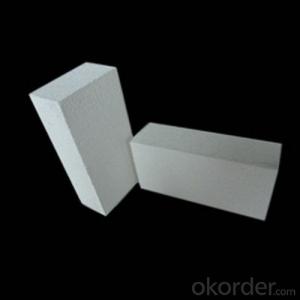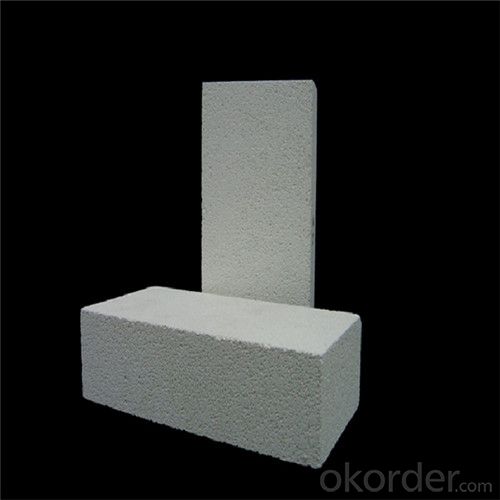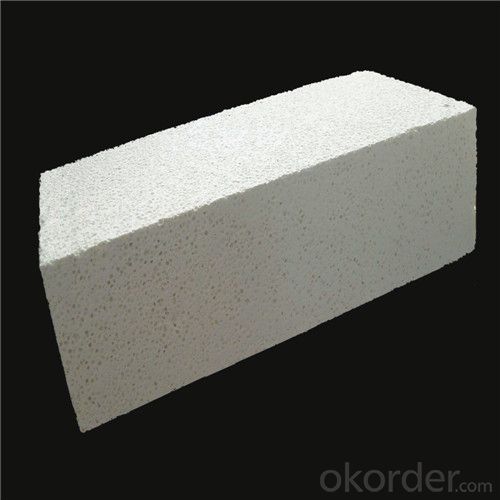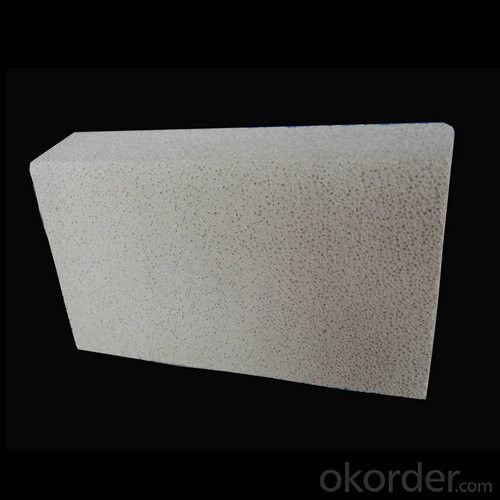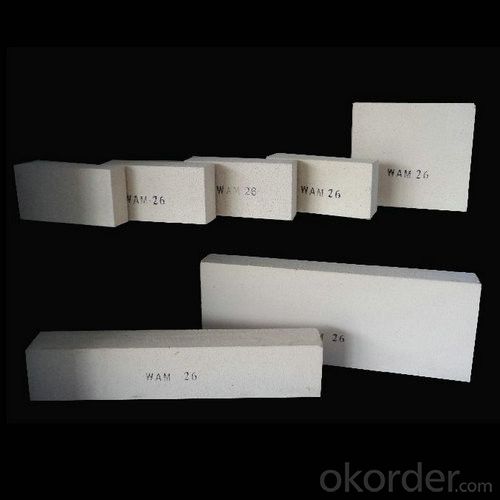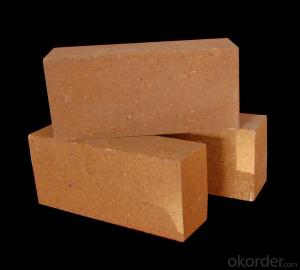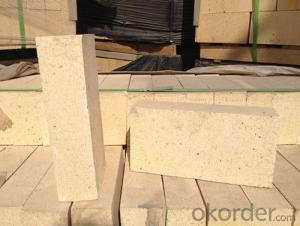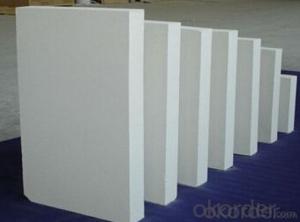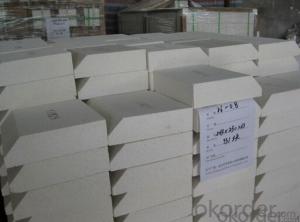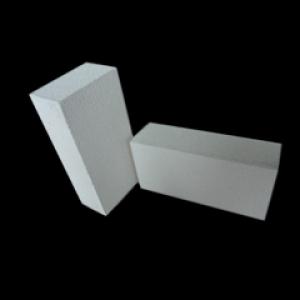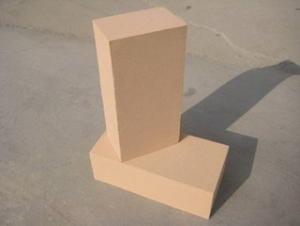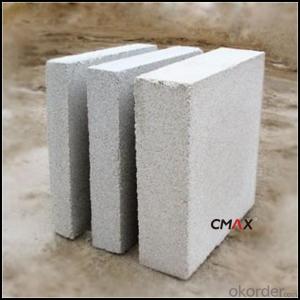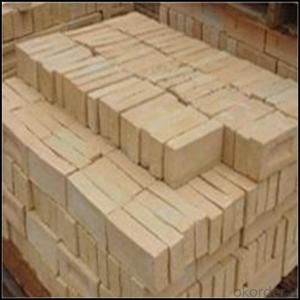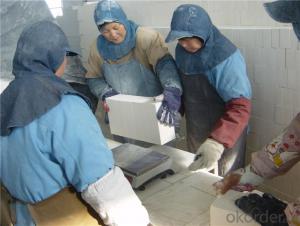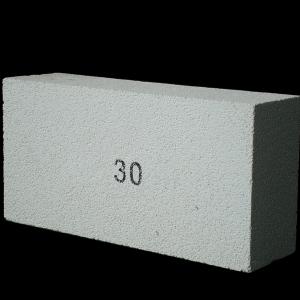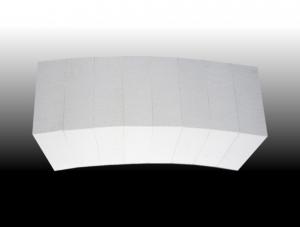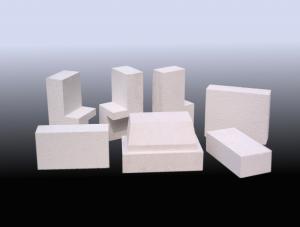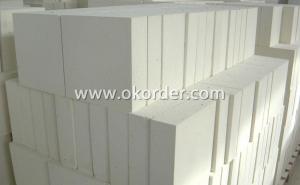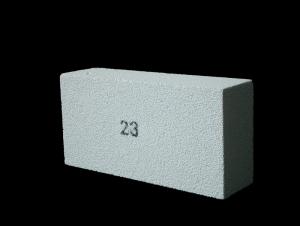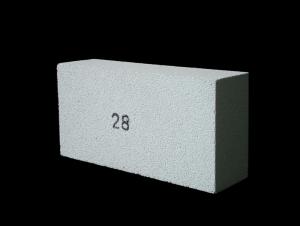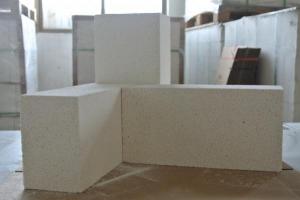High-Temperature Insulating Fire Bricks
- Loading Port:
- Shanghai
- Payment Terms:
- TT or LC
- Min Order Qty:
- 1 m.t.
- Supply Capability:
- 1000 m.t./month
OKorder Service Pledge
OKorder Financial Service
You Might Also Like
General Information of Insulation Fire Brick
CMAX Insulation Fire Brick are classified under temperature between 1300℃ to 1700℃, manufactured from high purity alumina clay.
Image of Insulation Fire Brick
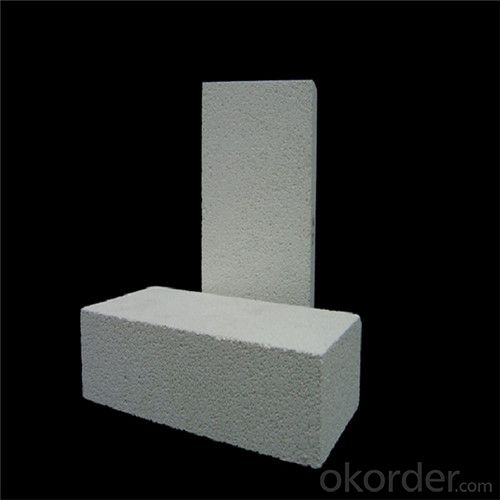
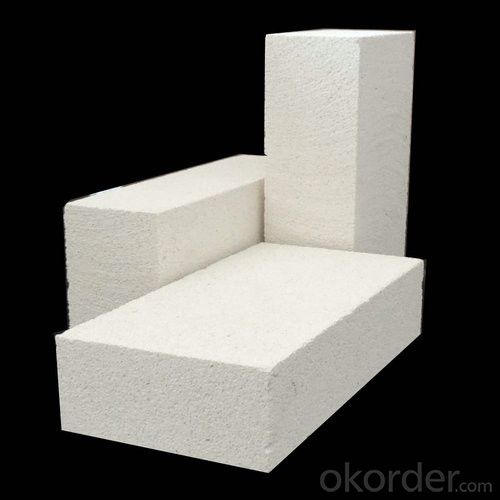
Technical Data of Insulation Firebricks
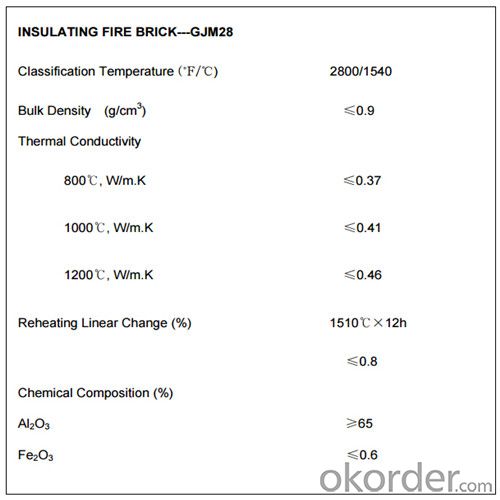
Feature of Insulation Fire Brick
Light weight and low thermal conductivity
Low heat storage
Low iron and impurities
High thermal shock resistance
Application of Insulation Fire Brick
CMAX Insulation Fire Brick can be used as a hot face lining directly exposed to the heat or as a backup insulation layer in iron and steel mills, non-ferrous foundries, petrochemical, ceramic, glass.
Why Choose Us
l We are a government owned company with ISO certificate.
l We are listed in Global Fortune 500 with D & B report.
l We have more than 11 refractory production facilities and bases across China. We have a wide products range, such as ceramic fiber products (ceramic fiber blanket, module, board, paper, bulk), ceramic fiber textile (ceramic fiber rope, cloth, tape, yarn) etc, refractory brick (fireclay brick, high alumina brick, silica brick, magnesia brick etc), monolithic refractory materials, insulating fire brick, calcium silicate board, mica sheet, steel fiber. You can find various products here, and we can combine the light weight ceramic fiber products with the heavy weight refractory brick in one container delivery, then save the sea freight for you.
l We have strict materials selecting system and quality control system. We have the ability to take responsibility for your orders and product quality.
FAQ
Q1: How do you control the products quality?
A1: With strict quality control system throughout the materials selection and production process, our refractory and ceramic fiber products quality is effectively controlled to meet customer requirements.
From the raw materials selecting, our quality control begin. The quality certificates of raw materials are required and each batch will be tested before using. During production, the quality control are conducted by workers and then each piece will be sorted and examined by quality supervis
Q2: What`s the lead time for my order?
A2: It depends on customers’ requirements and our production schedule. And usually we need 30-60 days for refractory bricks,10-25 days for unshaped refractory materials and 10-20 days for ceramic fiber blankets.
Q3: Can you offer Door-to-Door delivery?
A3: Yes, but only for some countries such us U.S., UAE, Saudi Arabia, Iran, and Russia, etc.
Q4: What is the minimum quantity?
A4: There is no minimum order quantity. Depending on the item and processing, there may be a minimum production required, however we can offer a quotation based only on the quantity you need.
Q5: Can you give me a brief introduction of the application of your products?
A5: CNBM (China National Building Material) core refractory business comprises the production, sale and installation of high-grade refractory products, the development and implementation of customized system solutions as well as rendering outstanding services for the key industries in Glass, Iron& Steel, Petrochemical, Cement, Ceramic and Nonferrous Metals.
- Q: Difference between inorganic insulation material and organic thermal insulation material
- 1, organic insulation material with light weight, good processability, high compactness, good insulation effect, but the disadvantage is: aging resistance, deformation coefficient, poor stability, poor security, easy combustion, ecological environmental protection is poor, difficult construction, construction cost is higher, and the limited resources. It is difficult to recycle.2, inorganic insulation materials with energy-saving, waste, heat insulation, fire protection, antifreeze, anti-aging and excellent performance, as well as low prices and other characteristics, can achieve A-level fire protection, has a wide range of market demand.
- Q: Are insulating fire bricks resistant to cracking under pressure?
- Yes, insulating fire bricks are resistant to cracking under pressure. These bricks are specifically designed to withstand high temperatures and mechanical stress. They are made from lightweight materials with low thermal conductivity, such as ceramic fiber or lightweight aggregates, which allow them to retain their structural integrity even when subjected to pressure or thermal expansion. Additionally, insulating fire bricks often have a high percentage of alumina content, which enhances their strength and resistance to cracking. These properties make them an ideal choice for applications that require insulation and structural stability, such as furnaces, kilns, and high-temperature industrial processes. However, it is important to note that excessive pressure or sudden temperature changes can still cause damage to insulating fire bricks, so proper installation and maintenance guidelines should be followed to ensure their longevity and performance.
- Q: Are insulating fire bricks resistant to mold or mildew?
- No, insulating fire bricks are not resistant to mold or mildew. These types of bricks are specifically designed to withstand high temperatures and provide excellent insulation, but they do not possess any inherent resistance to mold or mildew growth. Mold and mildew can still develop on the surface of insulating fire bricks if they are exposed to moisture or damp conditions. To prevent mold or mildew growth, it is important to ensure that the bricks are kept dry and well-ventilated. Regular cleaning and maintenance can also help in preventing the growth of mold or mildew on the surface of insulating fire bricks.
- Q: Can insulating fire bricks be used in the construction of boilers for steam generation?
- Indeed, insulating fire bricks possess the capability to be employed in the manufacturing process of steam-generating boilers. These bricks are purposefully engineered to possess a meager thermal conductivity, thereby mitigating heat dissipation and enhancing the boiler's overall energy efficiency. In practice, they are frequently utilized in the construction of boiler partitions, bases, and furnace linings, given their ability to endure extreme temperatures and bestow remarkable insulation attributes. The integration of insulating fire bricks in boiler construction ensures that the heat generated from fuel combustion is efficiently contained and transferred to the water, culminating in proficient steam generation.
- Q: Can insulating fire bricks be used in the construction of lime production ovens?
- Yes, insulating fire bricks can be used in the construction of lime production ovens. Insulating fire bricks are specifically designed to withstand high temperatures and provide excellent thermal insulation. Lime production ovens require materials that can withstand the extreme heat generated during the process of converting limestone into lime. Insulating fire bricks not only have a high heat resistance, but they also have low thermal conductivity, which helps to minimize heat loss and improve energy efficiency in the lime production process. Additionally, insulating fire bricks are lightweight and easy to handle, making them suitable for the construction of lime production ovens.
- Q: Are insulating fire bricks resistant to electrical conductivity?
- Yes, insulating fire bricks are resistant to electrical conductivity.
- Q: What are the improvements and improvements during the trial production of insulating bricks?
- Per square metre weighs only about 1.4 kilograms, reduce the burden of building.Simple production: completely break through the traditional process, greatly shorten the construction cycle.
- Q: Do insulating fire bricks require any special cleaning procedures?
- Special cleaning procedures are not necessarily needed for insulating fire bricks. Nevertheless, just like any other substance, they can gather dust, dirt, or debris as time goes on, which may diminish their insulating capabilities. To uphold their effectiveness, it is suggested to occasionally eliminate any loose particles by gently brushing or vacuuming the surface of the bricks. If the bricks come into contact with oil or grease, it is recommended to utilize a mild detergent or soap solution for cleansing the affected regions. In general, consistent maintenance and preventing excessive accumulation will guarantee their optimal performance.
- Q: Are insulating fire bricks chemically resistant?
- Insulating fire bricks are generally chemically resistant to a wide range of substances. These bricks are typically made from high-quality refractory materials such as alumina, silica, or a combination of both. These materials have excellent resistance to chemical attack, making insulating fire bricks highly resistant to the corrosive effects of various chemicals. However, it is important to note that the chemical resistance of insulating fire bricks can vary depending on the specific composition and manufacturing process. While they are generally resistant to most chemicals, there may be certain aggressive chemicals or extreme conditions that could potentially degrade or erode the bricks over time. To ensure the optimal chemical resistance of insulating fire bricks, it is recommended to consult the manufacturer's specifications or seek expert advice for specific applications. This will help ensure that the bricks are suitable for the intended chemical environment and will perform reliably over the desired lifespan.
- Q: Are insulating fire bricks fire-rated?
- Yes, insulating fire bricks are fire-rated. They are specifically designed to withstand high temperatures and provide excellent thermal insulation in various applications. These bricks are made from a special type of ceramic material with low thermal conductivity, which allows them to retain heat and prevent it from transferring to the surrounding areas. This property makes them highly resistant to fire and helps protect the structures they are used in. Insulating fire bricks are commonly used in furnaces, kilns, fireplaces, and other high-temperature environments where fire protection is crucial.
Send your message to us
High-Temperature Insulating Fire Bricks
- Loading Port:
- Shanghai
- Payment Terms:
- TT or LC
- Min Order Qty:
- 1 m.t.
- Supply Capability:
- 1000 m.t./month
OKorder Service Pledge
OKorder Financial Service
Similar products
Hot products
Hot Searches
Related keywords
